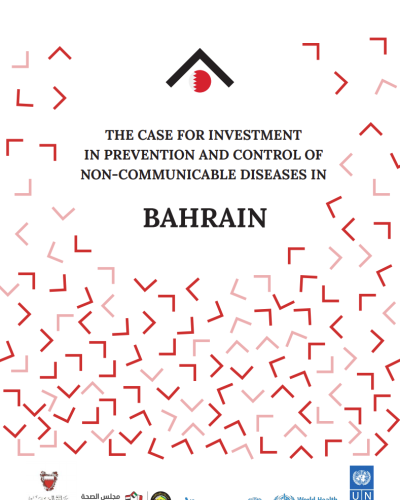The Case for Investment in Prevention and Control of Non-Communicable Diseases in Bahrain

As in many parts of the world, NCDs in Bahrain are causing a surge in costs expended by the government to provide healthcare, early retirement benefits, social care and welfare support. Moreover, NCDs contribute to reduced economic productivity when people in the workforce die prematurely and work at lower capacity due to illness. NCDs are exacerbated by COVID-19 and vice versa. NCDs and their risk factors – behavioural, environmental, and metabolic1 – increase, to varying degrees, susceptibility to COVID-19 infection and the likelihood of severe and fatal outcomes. NCDs therefore contribute to worse outcomes from COVID-19 including overwhelmed health systems, which, in turn, threaten to disrupt access to life-saving NCD services.
This report results from Bahrain’s engagement in 2017 with the United Nations Inter-Agency Task Force on the Prevention and Control of Non-communicable Diseases which resulted in recommended actions to implement United Nations Political Declaration on NCDs. Bahrain’s Ministry of Health made it a priority to conduct the NCD investment case presented here, which provides evidence that NCDs reduce economic output and that Bahrain would benefit from investing in four policy intervention packages that reduce exposure to behavioural risk factors (tobacco use, harmful use of alcohol, unhealthy diet and physical inactivity). It also examines investments in key clinical interventions for the most prevalent NCDs – cardiovascular diseases and diabetes. The findings show that addressing NCDs is a matter of urgency to ensure significant social and economic returns.
Beyond the four policy packages modelled, the investment case discusses a range of issues that affect health and sustainable development in Bahrain. These include air pollution, the food system and urban design (see Box 3 and Recommendations #4), implementation of other cost-effective interventions such as bans on trans fats and health taxes on sugar (see Table 2) and other health-harming products, and integrated responses to NCDs and COVID-19 (see recommendations and Annex 1). The policy and clinical interventions analysed in this investment case represent critical first actions needed to fundamentally reverse NCD trends in Bahrain. The responsibility for action, as well as the benefits that come from it, fall beyond the health sector alone.









